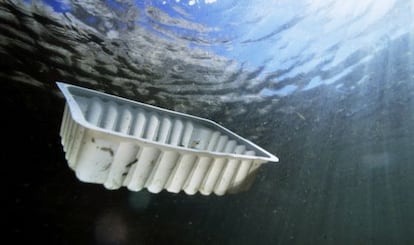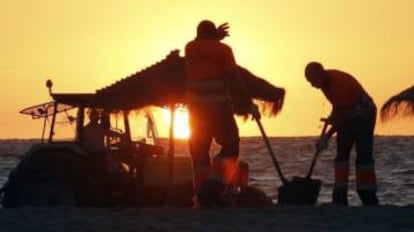A sea of plastic along Spain’s Mediterranean coastline
Researchers find similar levels of waste to those in saturated areas of the Atlantic and Pacific oceans

“Just like there was a Bronze Age and an Iron Age, we are now living through a Plastic Age,” says Andrés Cózar, a marine biologist and researcher at Spain's Cádiz University.
He should know. Cózar has spent the last few years exploring the seven seas as a member of projects such as the Malaspina Expedition, headed by the Superior Scientific Research Council.
Together with his team, Cózar has proved that there are “five major accumulations of plastic waste in the open ocean, coinciding with the five major ocean gyres.”
Despite the bad news, Cózar remains optimistic because he feels that steps are being taken in the right direction
Beside the well-known accumulation of plastic residues in the North Pacific Gyre - a rotating water current - researchers have found similar waste in the center of the North Atlantic, South Pacific, South Atlantic and the Indian Ocean.
And Cózar’s latest research also shows “a sixth large accumulation of plastics” in the Mediterranean Sea.
“When we compared the measurements in the Mediterranean with the ones we took in each one of the gyres, including the much-discussed North Pacific Gyre, we saw that the average concentrations were similar to those in the Mediterranean,” he explains.
Sign up for our newsletter
EL PAÍS English Edition has launched a weekly newsletter. Sign up today to receive a selection of our best stories in your inbox every Saturday morning. For full details about how to subscribe, click here.
And what’s more, Cózar says, the samples taken from the surface water could be “just the tip of the iceberg of plastic waste, less than one percent.” Large amounts of microplastics, he warns, are trickling down the food chain and to the sea bed.
Cózar revealed these findings at the 5th International Symposium on Marine Sciences, held recently at Alicante University.
The researcher also told a crowd of experts and students that there are high concentrations of plastic “in the first kilometer off the coastline.”
Until now, “what we knew was that it accumulates in the center of the gyres, which are located thousands of kilometers off the coast, but there are in fact coastal areas where the concentration is equally high.”
According to Cózar, the plastic is blown around at the mercy of the winds until it hits the coast and starts building up there. The issue is also relevant because Spaniards are big fish consumers.
“Studies from Thailand and the United States show that between 25% and 40% of fish and clams sold in markets contained plastic,” he says. Such a study has not been conducted on Spain’s coasts, but Cózar believes that it would yield similar results.

Despite the bad news, Cózar remains optimistic because he feels that steps are being taken in the right direction. One of these is a ban on plastic bags in Morocco.
Cózar also defends investing in measures “such as removing plastic from beaches, because storms bring up large amounts of trash and it can then be removed with little effort.”
In his opinion, it is essential to seek the cooperation of local fishing guilds and diving associations in order to address the issue of plastics at the sea bottom. In Villajoyosa (Alicante), local fishermen have launched a project to turn the plastic that gets caught in their nets into textiles.
Other efficient measures, says Cózar, include setting up floating barriers at the mouth of urban rivers, improving waste management techniques, researching new materials to replace plastic, encouraging volunteer cleanup in coastal areas, and conducting awareness campaigns to show people that “what goes into the sea could end up on their plates.”
English version by Susana Urra.
Tu suscripción se está usando en otro dispositivo
¿Quieres añadir otro usuario a tu suscripción?
Si continúas leyendo en este dispositivo, no se podrá leer en el otro.
FlechaTu suscripción se está usando en otro dispositivo y solo puedes acceder a EL PAÍS desde un dispositivo a la vez.
Si quieres compartir tu cuenta, cambia tu suscripción a la modalidad Premium, así podrás añadir otro usuario. Cada uno accederá con su propia cuenta de email, lo que os permitirá personalizar vuestra experiencia en EL PAÍS.
¿Tienes una suscripción de empresa? Accede aquí para contratar más cuentas.
En el caso de no saber quién está usando tu cuenta, te recomendamos cambiar tu contraseña aquí.
Si decides continuar compartiendo tu cuenta, este mensaje se mostrará en tu dispositivo y en el de la otra persona que está usando tu cuenta de forma indefinida, afectando a tu experiencia de lectura. Puedes consultar aquí los términos y condiciones de la suscripción digital.
More information
Últimas noticias
Most viewed
- Sinaloa Cartel war is taking its toll on Los Chapitos
- Oona Chaplin: ‘I told James Cameron that I was living in a treehouse and starting a permaculture project with a friend’
- Reinhard Genzel, Nobel laureate in physics: ‘One-minute videos will never give you the truth’
- Why the price of coffee has skyrocketed: from Brazilian plantations to specialty coffee houses
- Silver prices are going crazy: This is what’s fueling the rally










































